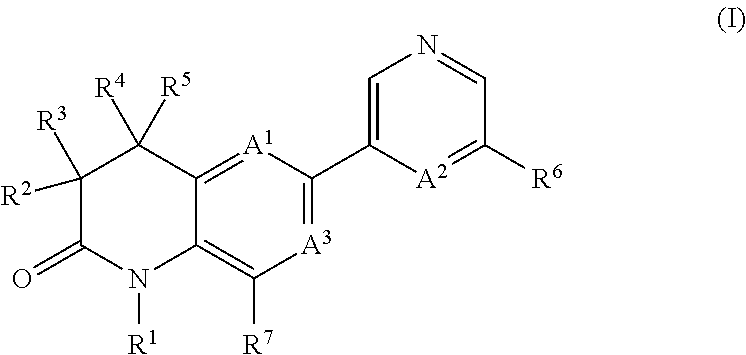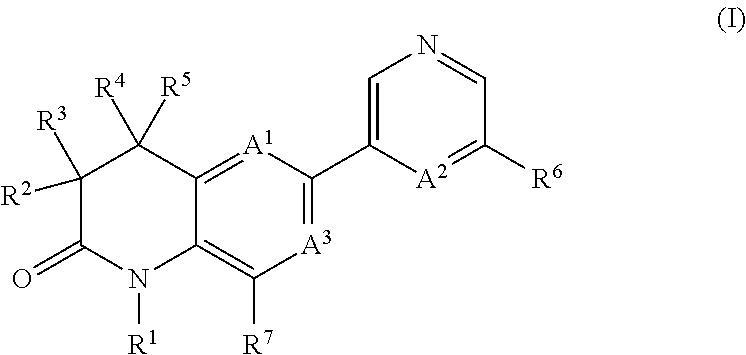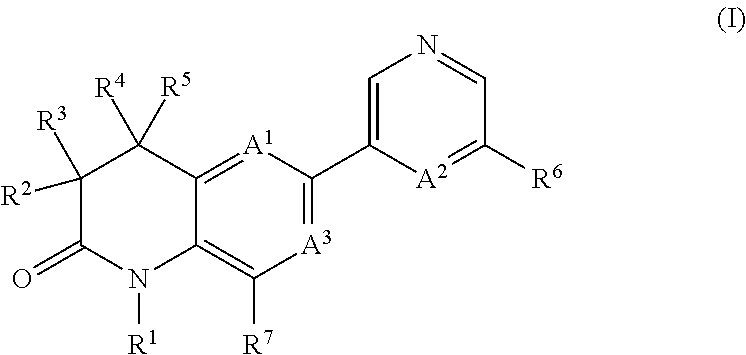Dihydroquinoline-2-one derivatives
a technology of dihydroquinoline and derivatives, applied in the field of organic compounds, can solve the problems of increased blood volume, increased risk of other physiological complications, increased blood pressure, etc., and achieve the effect of improving blood pressure, cardiac and renal function
- Summary
- Abstract
- Description
- Claims
- Application Information
AI Technical Summary
Benefits of technology
Problems solved by technology
Method used
Image
Examples
example 1
Ethanesulfonic acid [5-(1-methyl-2-oxo-1,2,3,4-tetrahydro-quinolin-6-yl)-pyridin-3-yl]-amide
[0720]
[0721]To a solution of 6-(5-amino-pyridin-3-yl)-1-methyl-3,4-dihydro-1H-quinolin-2-one (intermediate A-2, 0.02 g, 0.079 mmol) in DCM (0.5 mL) was added triethylamine (0.024 g, 0.237 mmol) followed by ethanesulfonyl chloride (0.01 g, 0.079 mmol) and the reaction mixture was stirred at room temperature for 1 h. The mixture was diluted with DCM, poured into water (5 mL) and the aqueous layer was extracted with DCM (2×20 mL). Combined organics were dried over Na2SO4, filtered and evaporated to dryness. The residue was purified by silica gel flash chromatography eluting with a 0 to 10% MeOH-DCM gradient to give the title compound (0.007 g, 23%) as a brown solid. MS: 346.0 (M+H+).
example 2
Acetic acid [5-(1-methyl-2-oxo-1,2,3,4-tetrahydro-quinolin-6-yl)-pyridin-3-ylcarbamoyl]-methyl ester
[0722]
[0723]To a solution of 6-(5-amino-pyridin-3-yl)-1-methyl-3,4-dihydro-1H-quinolin-2-one hydrochloride (intermediate A-2, 0.045 g, 0.155 mmol) in DCM (1.5 mL) was added TEA (0.039 g, 0.388 mmol) followed by 2-chloro-2-oxoethyl acetate (0.017 g, 0.124 mmol) in DCM (1 mL) and the reaction mixture was stirred at room temperature for 2 h. The mixture was diluted with DCM, poured into aq. NaHCO3 (10 mL) and the aqueous layer was extracted with DCM (2×25 mL). Combined organics were washed with brine, dried over Na2SO4, filtered and evaporated to dryness. The residue was purified by silica gel flash chromatography eluting with a 0 to 5% MeOH-DCM gradient to give the title compound (0.025 g, 46%) as a light brown solid. MS: 354.2 (M+H+).
example 3
2-Hydroxy-N-[5-(1-methyl-2-oxo-1,2,3,4-tetrahydro-quinolin-6-yl)-pyridin-3-yl]-acetamide
[0724]
[0725]To a solution of acetic acid [5-(1-methyl-2-oxo-1,2,3,4-tetrahydro-quinolin-6-yl)-pyridin-3-ylcarbamoyl]-methyl ester (example 2, 0.025 g, 0.071 mmol) in MeOH (1 mL) was added a 1M aqueous solution of Na2CO3 (0.354 mL) and the reaction mixture was stirred at room temperature for 1 h. The mixture was evaporated to dryness, the residue dissolved in EtOAc (20 mL) and washed with aq. NaHCO3 (5 mL). The organic layer was separated, dried over Na2SO4, filtered and evaporated to dryness to give the title compound (0.02 g, 91%) as light brown solid. MS: 312.1 (M+H+).
PUM
| Property | Measurement | Unit |
|---|---|---|
| temperature | aaaaa | aaaaa |
| temperature | aaaaa | aaaaa |
| temperature | aaaaa | aaaaa |
Abstract
Description
Claims
Application Information
 Login to View More
Login to View More - R&D
- Intellectual Property
- Life Sciences
- Materials
- Tech Scout
- Unparalleled Data Quality
- Higher Quality Content
- 60% Fewer Hallucinations
Browse by: Latest US Patents, China's latest patents, Technical Efficacy Thesaurus, Application Domain, Technology Topic, Popular Technical Reports.
© 2025 PatSnap. All rights reserved.Legal|Privacy policy|Modern Slavery Act Transparency Statement|Sitemap|About US| Contact US: help@patsnap.com



